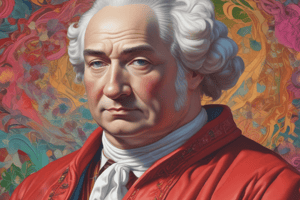Podcast
Questions and Answers
According to Hume, what is the primary source of the contents of the mind?
According to Hume, what is the primary source of the contents of the mind?
- Supernatural forces
- Experience (correct)
- Innate ideas
- Intuition
What did Hume agree with Berkeley about our experience of the physical world?
What did Hume agree with Berkeley about our experience of the physical world?
- We can only have perceptions of the physical world (correct)
- The physical world does not exist
- The physical world is an illusion
- We can directly experience the physical world
What did Hume distinguish between in terms of mental content?
What did Hume distinguish between in terms of mental content?
- Simple and complex perceptions
- Conscious and subconscious thoughts
- Impressions and ideas (correct)
- Innate and acquired ideas
According to Hume, what is the role of the imagination in relation to ideas?
According to Hume, what is the role of the imagination in relation to ideas?
What did Hume see as the basis for beliefs about the connections between ideas?
What did Hume see as the basis for beliefs about the connections between ideas?
What did Hume see as the three main laws of association that connect ideas?
What did Hume see as the three main laws of association that connect ideas?
What was Hume's view on the relationship between cause and effect?
What was Hume's view on the relationship between cause and effect?
According to Hume, what is the nature of the mind and the self?
According to Hume, what is the nature of the mind and the self?
What did Hume see as the primary determinant of human behavior?
What did Hume see as the primary determinant of human behavior?
What was one of Hume's key contributions, according to the passage?
What was one of Hume's key contributions, according to the passage?
What was Hume's primary goal in his writing?
What was Hume's primary goal in his writing?
Why did Hume's early publications receive little attention?
Why did Hume's early publications receive little attention?
Which of the following subjects did Hume not write extensively about?
Which of the following subjects did Hume not write extensively about?
What method did Hume employ in his moral philosophy?
What method did Hume employ in his moral philosophy?
How did Hume's relationship with the Scottish Clergy influence his work?
How did Hume's relationship with the Scottish Clergy influence his work?
What did Hume intend to achieve with his work on moral philosophy?
What did Hume intend to achieve with his work on moral philosophy?
Flashcards are hidden until you start studying
Study Notes
Impressions and Ideas
- All ideas originate from experience and can be caused by internal or external events.
- We can't experience the physical world directly, only perceive it.
- Impressions are strong, vivid perceptions, often accompanied by strong emotions, while ideas are weaker and less vivid.
Simple and Complex Ideas and the Imagination
- All simple ideas were once impressions.
- Ideas can be rearranged in the mind through imagination.
- Consistently experiencing ideas together creates beliefs that one will follow the other.
- The strength of belief depends on experiences.
The Association of Ideas
- Ideas connected only by the mind would be loose and different for each person.
- Hume identified three laws of association:
- Law of Resemblance: thoughts run easily from one idea to the next.
- Law of Contiguity: we think of objects experienced at the same time.
- Law of Cause and Effect: we think of outcomes and their causes.
Analysis of Causation
- Causation is not a logical necessity, but a psychological experience.
- Cause and effect must be contiguous in space and time.
- Cause must be prior to effect.
- There must be a constant union between cause and effect.
- The same cause always produces the same effect.
Analysis of the Mind and the Self
- All beliefs come from reoccurring experiences explained by laws of association.
- The mind is no more than the thoughts we are having at any given moment.
- There is no mind or self independent of perceptions.
Emotions and Behavior
- Humans have had the same emotions throughout history, but not to the same degree.
- Emotions and experiences become associated with ideas.
- People learn how to act through reward and punishment of reaction.
- Reasoning has nothing to do with behavior.
Hume's Influence and Life
- Increased the importance of Psychology.
- Hume studied law and commerce at University of Edinburgh but did not get a degree.
- He wrote Treatise of Human Nature, but it did not receive much attention.
Hume's Goal
- Hume aimed to introduce the experimental method of reasoning into moral subjects.
- He followed empirical methods and wrote on various subjects, including math, physical sciences, and politics.
- Hume was impressed by Newton and wanted to do for moral philosophy what Newton had done for natural philosophy.
Studying That Suits You
Use AI to generate personalized quizzes and flashcards to suit your learning preferences.





